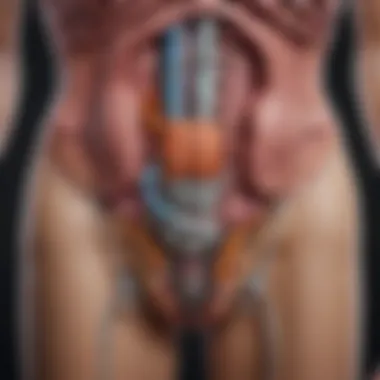Linking Urinary Infections with Gastrointestinal Issues


Intro
Understanding the intricate relationship between urinary infections and gastrointestinal symptoms is paramount for healthcare professionals and researchers alike. While urinary tract infections (UTIs) are often seen as isolated incidents affecting only the urinary system, emerging evidence suggests a notable connection to gastrointestinal issues, specifically diarrhea. This article explores how UTIs can influence the gastrointestinal tract, the underlying mechanisms, and the broader implications of these concurrent symptoms.
Key Concepts
Definition of Primary Terms
To truly grasp the complexity of urinary infections and their effects on health, it is essential to clarify some key terms:
- Urinary Tract Infection (UTI): An infection that can occur in any part of the urinary system, including the kidneys, bladder, and urethra. UTIs are typically caused by bacteria, with Escherichia coli being the most prevalent culprit.
- Diarrhea: Characterized by loose or watery stools, diarrhea can vary in severity and duration. It is often caused by infections, including those affecting the urinary tract, leading to inflammation and added stress on the gastrointestinal system.
Related Concepts and Theories
- Microbiome Impact: The gut microbiome plays a significant role in overall health. Disruption in gut bacteria due to infections or antibiotic treatment for a UTI may lead to gastrointestinal disturbances.
- Inflammatory Responses: Both UTIs and gastrointestinal issues can trigger inflammatory reactions in the body. The shared inflammatory pathways may elucidate why these two conditions often coexist.
"The interplay between our urinary and gastrointestinal systems is a complex dance, where one’s misstep can influence the other."
- Central Nervous System Link: Research suggests that the brain-gut connection can influence both urinary and gastrointestinal health, impacting symptom perception and severity. Stress and anxiety can exacerbate both issues, leading to a cyclical pattern of discomfort.
Future Directions
Gaps Identified in Current Research
Despite significant advancements, there remain areas lacking comprehensive research:
- Causal Relationship: More studies are needed to establish a clear cause-and-effect relationship between UTIs and gastrointestinal symptoms, as existing studies often focus on observational data.
- Long-term Effects: Longitudinal studies assessing the long-term impacts of recurrent UTIs on gastrointestinal health are sparse, making it difficult to draw definitive conclusions.
Suggestions for Further Studies
To fill identified gaps, the following research avenues could be explored:
- Clinical Trials: Investigating specific treatments aimed at mitigating gastrointestinal symptoms in patients suffering from UTIs.
- Microbiome Studies: Conducting in-depth analysis of how alterations in gut bacteria due to UTIs contribute to gastrointestinal symptoms.
Culmination
Understanding Urinary Tract Infections
Urinary tract infections (UTIs) are a significant health concern, not just for the discomfort they cause but also for their potential to impact overall wellbeing. In exploring the connection between urinary and gastrointestinal symptoms, it's essential to understand the nuances surrounding UTIs, including their definition, demographics, and common symptoms. This understanding lays the groundwork for examining how these infections might also trigger or exacerbate gastrointestinal issues such as diarrhea.
Definition and Types
At its core, a urinary tract infection refers to an infection in any part of the urinary system, which includes the kidneys, ureters, bladder, and urethra. These infections are commonly classified into two main types: uncomplicated and complicated UTIs. Uncomplicated UTIs primarily affect healthy individuals, are often limited to the bladder, and are generally treatable with standard antibiotics. On the other hand, complicated UTIs may involve structural abnormalities or existing health conditions that hinder treatment, potentially leading to more severe complications. Understanding these distinctions is crucial for determining effective treatment strategies and understanding their impact on other health conditions.
Prevalence and Demographics
UTIs are widespread and vary across different populations. Statistics show that nearly 50% of women will experience at least one UTI in their lifetime, contributing significantly to healthcare visits. Men, while less frequently afflicted, also face risks—especially older adults who may develop UTIs due to prostate issues or catheter use. In terms of demographics, women aged 18 to 24 seem to be the most vulnerable. Additionally, certain populations, like those with diabetes or kidney stones, possess a higher likelihood of encountering UTIs. Recognizing these patterns isn’t merely trivial; it informs prevention strategies and guides clinical attention where it may be needed most.
Common Symptoms
Identifying the common symptoms of UTIs is crucial, not only for diagnosis but for differentiating them from other conditions. The hallmark signs often include:
- A burning sensation during urination
- Frequent urges to urinate, even when little comes out
- Cloudy or strong-smelling urine
- Lower abdominal pain or pressure
- Blood in urine (hematuria)


It’s vital to note that while these symptoms are prevalent, they can overlap with other medical issues, adding complexity to diagnosis and treatment. Understanding the symptoms ensures that patients can address their concerns promptly and seek medical intervention when necessary.
"A proactive approach to understanding urinary tract infections can significantly improve patient outcomes and quality of life."
Gastrointestinal Symptoms and Their Mechanisms
Understanding how the gastrointestinal system responds and interacts with urinary infections is pivotal for clinicians and researchers alike. The gut and urinary tract are interconnected in ways that can complicate diagnoses and treatment. Moreover, recognizing gastrointestinal symptoms like diarrhea in the context of urinary infections can lead to timely and effective management. This section unfolds the multifaceted relationship between these systems, highlighting mechanisms that might be at play, and the implications of these interactions on patient health.
Defining Diarrhea
Diarrhea is a term that describes liquid or watery stools, often occurring more frequently than normal. It is not simply an inconvenience but a symptom that can stem from various underlying conditions. Defining diarrhea requires a nuanced approach as it can be either acute—lasting a few days—or chronic—persisting for weeks or even months. Understanding what diarrhea entails is critical because it often signals an upset in the body’s homeostasis, and it is particularly important to discern its origins in clinical settings. From food intolerances to bacterial infections, there are numerous culprits that can lead to this uncomfortable condition.
Causes of Diarrhea
There are an array of factors that can lead to diarrhea, ranging from dietary changes to infections. Common causes include:
- Bacterial Infections: These can be due to contaminated food or water, introducing pathogens like Escherichia coli or Salmonella into the system.
- Viral Infections: Norovirus and rotavirus are notorious for causing outbreaks of gastroenteritis, leading to diarrhea.
- Food Intolerances: Individuals who are lactose intolerant, for example, often experience diarrhea after consuming dairy products.
- Medications: Certain medications, including antibiotics, can disturb the gut flora, resulting in diarrhea.
Understanding these causes is essential since they can influence the management of both gastrointestinal and urinary tract conditions.
Relationship Between Infections and Diarrhea
The link between urinary infections and gastrointestinal symptoms like diarrhea is a complex interplay. While urinary tract infections primarily affect the urinary tract, evidence suggests that they can trigger gastrointestinal responses due to shared neural pathways or inflammatory mediators in the body. When the body detects an infection, it can initiate a broader immune response that affects multiple systems.
One mechanism involves the inflammatory response. When the body fights an infection, pro-inflammatory cytokines are released which, while aimed at combating pathogens, can also disrupt normal gut function, leading to symptoms like diarrhea. Furthermore, the use of antibiotics for urinary infections may contribute to this situation, as they can reduce beneficial gut bacteria, creating an imbalance and increasing susceptibility to diarrhea.
"Recognizing the interconnectedness of bodily systems is crucial in treating infections effectively. A holistic view may lead to better outcomes for patients suffering from multiple symptoms."
In summary, exploring the mechanisms and relationships associated with gastrointestinal symptoms gives health professionals important insights. Identifying the nuances in these connections can enhance diagnostic accuracy and treatment effectiveness, ultimately benefiting overall health outcomes.
The Link Between Urinary Infections and Diarrhea
The relationship between urinary infections and gastrointestinal symptoms, especially diarrhea, is a multifaceted one that deserves attention not only for its clinical implications but also for its impact on overall health. Understanding how urinary infections can provoke gastrointestinal disturbances is essential in crafting effective treatment strategies. This connection serves as a reminder that our bodily systems are interconnected and that disturbances in one area can create ripples throughout others.
The role of urinary infections in gastrointestinal symptoms involves more than just a simple cause and effect. There are various mechanisms that can facilitate this cross-influence, influencing both the diagnosis and the treatment approaches taken by healthcare providers. Acknowledging the significance of this link can help in patient management and customization of therapies tailored to individual needs.
Mechanisms of Cross-Influence
Multiple pathways explain how urinary infections can lead to gastrointestinal symptoms. One of the key players here is the immune response. When the body detects a urinary tract infection, it initiates an inflammation response that could potentially affect gut function.
Furthermore, the microbiome's delicate balance might get disrupted during a urinary tract infection, leading to repercussions for the gastrointestinal tract. Changes in the body’s environment could lead to a profound impact on gut health, pointing toward a deep-seated network of interactions at play. Consequently, it is critical to delve into this web of relationships to understand how one factor influences the other.
Inflammatory Responses and Gastrointestinal Impact
Inflammation resulting from a urinary tract infection can play a dual role in the body. While it’s a necessary response for fighting infections, it can also lead to unintended consequences, particularly in the gastrointestinal tract.
Cytokines, released during this inflammation, can affect gut motility and contribute to conditions like diarrhea. The gut lining suffers as a result, making it more permeable and susceptible to further disturbances. A body that’s already battling an infection may find itself on the slippery slope toward gastrointestinal distress, presenting challenges that healthcare professionals need to address.
The Role of Antibiotics
Antibiotics are often used as a first line of defense against urinary infections. They effectively kill off pathogens but come with a set of side effects that can complicate matters, especially concerning diarrhea. Here’s a deeper look into how antibiotics influence gut health and the interplay between urinary infections and gastrointestinal symptoms.
Antibiotic-Induced Dysbiosis


Antibiotic-induced dysbiosis refers to the imbalance created in the gut microbiome after a course of antibiotics. The key characteristic of this dysbiosis is the disruption of the microbial community that exists in the gut, leading to an overgrowth of opportunistic pathogens while beneficial bacteria diminish.
This factor is critical for this article because a disrupted microbiome can predispose individuals to gastrointestinal discomfort and conditions such as diarrhea. The unique feature of antibiotic-induced dysbiosis is that it is not merely a consequence of antibiotic use but a phenomenon that can lead to chronic health issues, underscoring the need for strategies to protect gut health during UTI treatment.
Effects on Gut Flora
The effects on gut flora are significant and profound following antibiotic treatment. A key feature of these effects is a reduction in bacterial diversity, which is essential for a healthy gut. This loss can impair digestion and absorption of nutrients and lead to complications like diarrhea.
For the purpose of this article, understanding the impact on gut flora is paramount. The imbalance from antibiotic use can create an environment where harmful bacteria thrive while beneficial ones struggle, paving the way for gastrointestinal issues. It’s essential to promote restorative practices, such as probiotics, to help restore the healthy balance disrupted by antibiotics.
Greater Susceptibility to Diarrhea
Greater susceptibility to diarrhea is a lasting consequence that can become apparent after treatment for a urinary infection. The key characteristic here is how an individual’s gut may respond with increased sensitivity to changes in their environment, particularly after undergoing antibiotic therapy.
This concept is relevant for this article because recognizing the propensity for increased gastrointestinal issues post-antibiotic treatment can guide healthcare providers in their recommendations for preventing these complications. By knowing that certain individuals are at a greater risk, more tailored approaches to treatment can be initiated, including dietary adjustments and supplementation with probiotics or prebiotics.
Symptoms Overlap: Diagnostic Challenges
The interconnection between urinary infections and gastrointestinal symptoms presents a unique challenge for both patients and healthcare providers. The overlapping nature of these symptoms can lead to diagnostic dilemmas that may complicate patient care and treatment decisions. Understanding this overlap is crucial not only for accurate diagnosis but also for effective management strategies. It emphasizes the need for a comprehensive approach when evaluating patients who may exhibit symptoms associated with both urinary tract infections (UTIs) and gastrointestinal issues.
Recognizing Symptom Patterns
Identifying specific patterns in symptoms is the first step towards tackling the complexities posed by misdiagnoses. It's essential to differentiate between the manifestations of UTIs—such as burning during urination or lower abdominal discomfort—and those relating to gastrointestinal disturbances like diarrhea or bloating. Certain patterns may signal that these symptoms are intertwined rather than isolated conditions.
For instance, urinary symptoms that are accompanied by abdominal pain may prompt a healthcare provider to consider a broader scope of investigation. Shifts in bowel habits, like an increase in frequency or urgency, should raise a red flag that the situation might be more complicated than it seems at first glance. Being aware of these signals can help providers to hone in on the right diagnosis more swiftly than relying on a traditional, symptom-by-symptom analysis.
Misdiagnosis Risks
Misdiagnosis is an ever-present risk in overlapping symptom scenarios. If a clinician focuses too narrowly on one set of symptoms, they might miss critical indicators of another condition. For example, assuming that diarrhea is solely due to a gastrointestinal infection without considering a possible UTI can lead to inappropriate treatment. This oversight can have cascading effects on a patient’s health,
"When healthcare providers fail to recognize the overlap in symptoms, they may inadvertently prolong a patient’s suffering or lead them down a less effective treatment path."
Inappropriate treatment not only fails to address the root cause but can also exacerbate existing conditions, complicate recovery, and even increase healthcare costs. Moreover, for patients experiencing both urinary and gastrointestinal symptoms, the emotional toll can be significant, leading to frustration and diminished quality of life.
When to Seek Medical Attention
Being informed about when to seek medical attention is vital for individuals experiencing overlapping symptoms. If a person finds themselves dealing with persistent abdominal pain accompanied by urinary symptoms, it is advisable to consult a healthcare professional without delay. Symptoms such as high fever, severe pain, or blood in the urine or stool are red flags that should never be ignored.
Additionally, a patient’s timeline of symptom development can provide important context. Symptoms that evolve suddenly or worsen over a short period deserve prompt medical evaluation. Comprehensive assessments, which may include urine tests and stool cultures, help establish the correct diagnosis.
Case Studies and Clinical Perspectives
Understanding the intricate relationship between urinary infections and gastrointestinal symptoms demands not only theoretical knowledge but also practical insights derived from real-life cases. Case studies present an invaluable tool that can reveal how various factors interplay in individual health scenarios. Through detailed examinations of specific instances, practitioners can gain nuanced perspectives that go beyond broad statistics and clinical guidelines. The benefits of integrating case study findings into clinical practice are manifold: they provide context, demonstrate variations in symptoms, and highlight how personalized approaches can enhance treatment outcomes.
Engagement with clinical perspectives also fosters critical thinking among healthcare professionals and students. It encourages them to analyze how urinary infections can differ in presentation and significantly overlap with gastrointestinal issues in various populations. Such insights are particularly crucial in today's healthcare environment, where data-driven means of diagnosis and treatment must be balanced with human-centered approaches.
"> Case studies are essential in revealing how known medical theories apply to real-life situations, giving voice to varied patient experiences."
Case Study Reviews
Case study reviews enable healthcare professionals to draw from a rich tapestry of patient narratives, showcasing instances where urinary infections precipitated gastrointestinal reactions. For instance, one case involved a young woman who frequently experienced urinary tract infections. Despite receiving standard antibiotic treatment, she began facing recurrent diarrhea. This led clinicians to explore not just the effectiveness of the antibiotic regimen but also the underlying factors contributing to her gastrointestinal distress. It turned out that her gut flora had suffered significantly due to the high frequency of antibiotic usage, necessitating probiotics to restore balance.
This type of detailed case study exemplifies how practitioners can glean lessons about the management of concurrent conditions, emphasizing the interconnectedness of bodily systems. Additionally, examining various demographic groups reveals patterns that can inform future treatment protocols. For example, elderly patients may be more susceptible to both UTIs and gastrointestinal disturbances due to age-related changes in anatomy and immune response.


Expert Opinions
Incorporating expert opinions into the discussion adds depth and a wealth of knowledge accumulated over years of clinical practice. Professionals specializing in urology and gastroenterology stress the significance of a holistic approach when treating patients with symptoms that bridge both fields. They draw attention to the notion that health care should not be compartmentalized; rather, treatments should consider potential overlaps in symptoms and root causes.
Experts advocate for cross-disciplinary collaboration, encouraging professionals to think broadly about patient health. For instance, a gastroenterologist may offer insight into a patient’s dietary needs post-antibiotic treatment, which can alleviate gastrointestinal distress following a urinary infection. This relational approach not only improves patient care but fosters a culture of shared learning among specialties.
Ultimately, diving into case studies along with expert insights reveals a tapestry of human experience and clinical knowledge. By focusing on these aspects, we can cultivate a deeper understanding of how urinary infections and gastrointestinal symptoms are intertwined, fostering better outcomes for individuals navigating these health challenges.
Prevention and Management Strategies
Addressing urinary infections and gastrointestinal symptoms requires a holistic approach centered on prevention and management. By understanding how to fend off infections and alleviate concurrent symptoms, individuals can significantly improve their quality of life. It’s crucial not only to tackle these health issues when they arise but also to implement strategies that enhance overall wellness. This section explores various methods to prevent urinary infections, manage diarrhea, and underscore the importance of hydration, providing insights into maintaining optimal health and balance.
Preventing Urinary Infections
The first line of defense against urinary tract infections is prevention. Being proactive can reduce the frequency of these infections, keeping unnecessary discomfort at bay.
- Personal Hygiene: Regular and proper hygiene can go a long way in safeguarding against UTIs. This includes wiping from front to back after using the restroom to prevent bacteria from entering the urinary system.
- Fluid Intake: Consuming a sufficient amount of fluids encourages frequent urination, which helps flush out potential pathogens before they can settle in the urinary tract. A diet rich in water contributes to this prevention strategy as well.
- Cranberry Products: There's evidence suggesting that cranberry juice or supplements can inhibit bacterial adherence to the bladder wall, though opinions on efficacy vary. Those looking for a natural remedy might find it worthwhile.
- Avoiding Irritants: Certain products like spermicides or harsh soaps can irritate the urethra, leading to increased risk of infection. Opting for gentle options can make a real difference.
Implementing these practices consistently can make a significant impact on reducing urinary infections.
Managing Diarrhea Concurrently
When a urinary infection coincides with gastrointestinal symptoms like diarrhea, it becomes essential to address both conditions. Here are some strategies to effectively manage these overlaps:
- Dietary Adjustments: During episodes of diarrhea, follow a bland diet that is easy on the stomach. Foods like bananas, plain rice, applesauce, and toast, known collectively as the BRAT diet, can help.
- Probiotic Use: Incorporating probiotics can assist in restoring the balance of gut flora, especially after antibiotic treatment. Yogurt and fermented foods can boost gut health and combat diarrhea.
- Targeted Medications: Over-the-counter anti-diarrheal medications can provide relief, but it's wise to consult a healthcare professional before use, especially when underlying conditions exist.
By covering both urinary and gastrointestinal issues, individuals can reduce symptom severity and duration.
Importance of Hydration
Staying adequately hydrated is a pillar of health and plays a vital role in both preventing urinary infections and managing diarrhea. Here’s why:
- Flushing Mechanism: Increased hydration helps dilute urine and promotes urination, which aids in flushing out pathogens from the urinary system.
- Maintaining Electrolyte Balance: Diarrhea can lead to significant fluid loss, causing dehydration and electrolyte imbalances. Ensuring good hydration can help maintain these levels and prevent complications.
- General Body Function: Hydration impacts every facet of bodily function, from digestion to cognitive performance. Staying hydrated helps the body operate smoothly, particularly when dealing with infections.
"Drinking plenty of fluids is not just good advice; it can be a game-changer for those at risk of urinary infections or experiencing diarrhea."
These strategies highlight the interconnectedness of urinary and gastrointestinal health. By being vigilant and proactive, individuals can pave the way for better health outcomes.
Future Research Directions
Understanding the intricate relationship between urinary infections and gastrointestinal symptoms is an evolving field. Future research in this area holds significant promise for clinical practice and patient outcomes. As we consider future directions, several critical elements come into play, including the exploration of emerging trends and deeper insights into the gut-brain connection.
Emerging Trends in UTI Research
Research on urinary tract infections has gained momentum over recent years. Some emerging trends include:
- Resistant Pathogens: The rise of antibiotic-resistant bacteria poses a significant challenge. Understanding the antibiotic resistance patterns specific to urinary infections may facilitate better treatment strategies and guide future antibiotic development.
- Microbiome Studies: New studies focus on the human microbiome’s role in urinary health, particularly how changes in gut flora correlate with urinary infections. This line of research is crucial as it can yield insights into preventive measures and innovative therapeutic approaches.
- Vaccine Development: Efforts to create effective vaccines against urinary pathogens are in the works. Exploring immune responses and their potential to prevent infections could drastically reduce the prevalence of UTIs.
Researchers are beginning to employ advanced techniques, such as metagenomics, to analyze the microbial communities in the gut and urine. This technology promises to uncover relationships that we're only beginning to understand.
Exploration of Gut-Brain Connections
The gut-brain axis is gaining traction as a valuable concept that connects digestive health with mental and emotional well-being. This connection is particularly relevant when looking at urinary infections and gastrointestinal symptoms. Potential directions for research here include:
- Neurotransmitters: Investigating how gut bacterial metabolites influence the production of neurotransmitters that affect gut motility and inflammation may provide insights into the interplay between UTIs and gastrointestinal symptoms.
- Psychobiotics: Exploring the use of probiotics to manage both urinary tract and gastrointestinal health could reveal new therapeutic avenues, especially in patients suffering from recurrent infections who also experience GI discomfort.
- Stress and Cognitive Function: The impact of stress on gut health may be another area of focus. This line of inquiry can potentially elucidate how psychological stressors influence both urinary tract health and gastrointestinal function, creating a cycle that exacerbates symptoms.
"If understanding how the gut and brain communicate can lead to innovative treatments, we may just be scratching the surface of what’s possible in managing urinary infections and their gastrointestinal consequences."
Future research directions must seize these opportunities to redefine how we understand, diagnose, and treat the complex interrelations between urinary infections and gastrointestinal health. In doing so, healthcare professionals may not only improve individual patient outcomes but also advance public health through informed interventions and prevention strategies.



